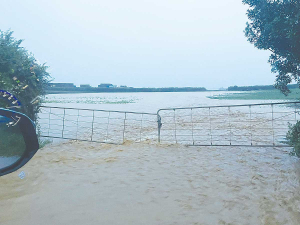Hort exporters eye Indian market
Exporters need to understand that India should not be seen as just one country to export to, rather a country of many unique states and regions.
 Recent flooding in the Pukekohe area has added to pressures to get early onion export shipments away on time.
Recent flooding in the Pukekohe area has added to pressures to get early onion export shipments away on time.
The recent wet weather in the Pukekohe area has added to pressures to get early onion export shipments away on time.
"We have a finite window for Europe which makes up 40% of exports so that's quite important," James Kuperus, chief executive of Onions New Zealand, told Hort News.
The first shipment was able to be sent in the first week of February with the focus now shifting to supplying the Spanish market.
"It will be tight but not impossible."
While Hawke's Bay has had a difficult season, crops grown in the Manawatu and Canterbury were looking good for the peak of the export season which runs until May, counter to European production.
"It's all about managing the quality and expectations of what will be coming out of Pukekohe."
It was too early to tell what the total damage to crops in the area was. Some of the flooding had been superficial but had added to quality concerns in what had already been a very wet season.
Kuperus says growers were aware of which of their onion blocks might be of lesser quality so woud be working with exporters to send class two products to other export markets, which didn't pay a premium for top quality, or for local processing.
The final returns for the season wouldn't be known until September. In recent years, onion exports have sat around a value of $150 million annually with the crop, grown on over 2,000 hectares, mainly exported to Europe and Indonesia.
Pāmu has welcomed ten new apprentices into its 2026 intake, marking the second year of a scheme designed to equip the next generation of farmers with the skills, knowledge, and experience needed for a thriving career in agriculture.
One team with 43 head, including a contingent from Mid Canterbury, are reflecting on a stellar NZ DairyEvent.
Fonterra farmer shareholders have approved the mechanism for a $2/share capital return expected from the sale of its global consumer and associated businesses.
Trainees in the horticulture industry studying towards a certificate or diploma can now apply for Horticulture New Zealand's (HortNZ) 2026 Industry Training Scholarships programme.
OPINION: The first three Global Dairy Trade (GDT) auctions have been a morale booster for farmers.
Former Fonterra executive Alex Turnbull has been appointed CEO to lead all five Yili Oceania Business Division companies in New Zealand.